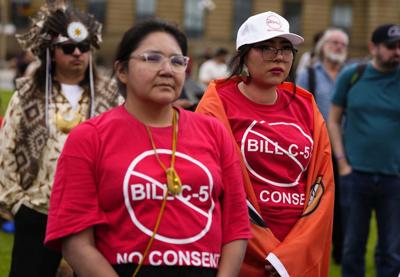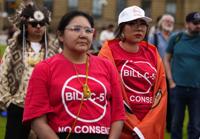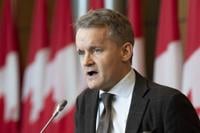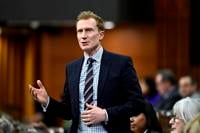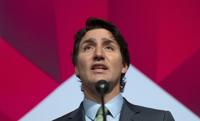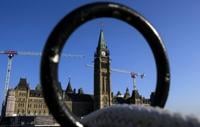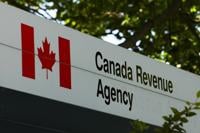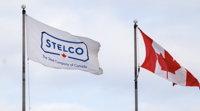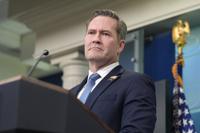OTTAWA - Many First Nations leaders say their expectations are low for the meeting planned on Thursday with Prime Minister Mark Carney and are warning it should not be seen as the full and fair consultation required on major projects.
The closed-door meeting was promised by Carney in June after chiefs said their rights were not respected by the rush to push the Building Canada Act, known as Bill C-5, through Parliament in June.
The legislation allows cabinet to quickly grant federal approvals for big industrial projects like mines, ports and pipelines by sidestepping existing laws. It is part of Carney's push to shore up Canada's economic prowess to withstand the battering ram of U.S. tariffs, and it was introduced, debated and passed into law over just 15 days last month.
B.C. Regional Chief Terry Teegee said he's a bit "cynical" about the meeting, and the process that led to it.
"If this (meeting) is a success, I think it's getting a solid commitment from the prime minister of discussions on how free, prior and informed consent will be implemented," Teegee said Wednesday morning.
"There are potentially going to be projects that are going to be very controversial, and it's those projects that I think the vast majority of chiefs are worried about."
Cody Diabo, grand chief of the Mohawk Council of Kahnawake, said if Canada uses the meeting to say it has consulted with First Nations, they'll again find themselves at odds with community.
"Canada wants to do what Canada wants to do," Diabo said in an interview with The şĂÉ«tv Press.
He said he doesn't have much hope for the outcome of the meeting.
"I am going to be pushing to speak at this event and give my stance at it, and I hope for their sake that they don't try to silence me."
Other chiefs at multiple press conferences Wednesday also stressed the government should listen to and address their concerns, rather than talk at them.
"We were promised a treaty relationship based on peace, mutual respect and the sharing of the land and its wealth," said Chief Angela Levasseur of Nisichawayasihk Cree Nation.
"Instead we are watching as Canada enacts new laws to fast-track development on our territories while the promises made to us over a century ago remain broken … We want what was promised. We want what's owed. And we want a fair share of the wealth taken from our territories."
Skepticism about the government's commitment to the meeting grew as Carney's office delayed providing information to chiefs about the plan for the event, asked for questions to be submitted in advance and put restrictions on who could attend.
An email was sent to chiefs on July 9 opening up registration for the meeting and the Chiefs of Ontario said it was initially able to register chiefs as well as legal advisers, technical and support staff to attend.
But a followup email a few days later confirmed the regional chief's registration but denied the registration requests for all others.
"It’s disappointing that technical staff, experts and lawyers from organizations and First Nations who were going to attend this meeting were uninvited after they were allowed to register. They all spent money on travel and accommodations to support chiefs during this critical discussion," the group representing 133 chiefs in the province said in a statement to The şĂÉ«tv Press.
"This legislation has the potential to fundamentally change this country and it’s unrealistic and unfair that the government has technical staff and lawyers in the room, but chiefs will not have that support."
The organization said it spent tens of thousands of dollars on flights and hotels for staff who now won't be allowed into the meeting.
Wet’suwet’en Hereditary Chief Na’Moks said he didn't receive an invitation to the meeting until 11:30 p.m. Tuesday, while he was already in transit to Ottawa.
"I don't need Canada's permission or validation to be here to speak the truth and hold them accountable when they want to destroy this country without any input from hereditary (chiefs) or any Indigenous people," he said. "They are just picking and choosing who sits that room."
Carney's staff have not yet responded to a request for comment from şĂÉ«tvabout the concerns being raised.
Ottawa asked First Nations chiefs to submit their questions in advance of the meeting, and the bulk of the questions on the online portal deal with how the government will respect the rights of First Nations.
"How does your government reconcile Bill C-5’s goal of 'economic efficiency' with the constitutional duty to consult and accommodate First Nations under Section 35?" reads one question, posed by Chief David Monias of Pimicikamak Cree Nation in Manitoba.
"Is economic streamlining being prioritized over constitutionally protected Indigenous rights?" he continued.
Monias told reporters on Wednesday that he almost didn't travel to Ottawa because of the wildfires affecting his community, and the evacuations taking place to keep people safe.
"All the industries, all the businesses, have destroyed our lands, have destroyed our climate," he said.
"Our lands are being destroyed, our people are being uprooted and displaced, and we're not benefiting from it. But the business people, yes, they will benefit from it."
On Tuesday, nine First Nations in Ontario asked a court to declare as unconstitutional both Ottawa's Bill C-5, and Bill 5 in Ontario, a similar provincial law meant to fast-track infrastructure projects. They are seeking an injunction to prevent the governments from using some of the most contentious aspects of the bills.
The communities say in the legal challenge filed in the Ontario Superior Court of Justice on Tuesday that Bill C-5 and Bill 5 both represent a "clear and present danger" to the First Nations' self-determination rights to ways of life on their territories.
— With files from Allison Jones in Toronto
This report by şĂÉ«tvwas first published July 16, 2025.

